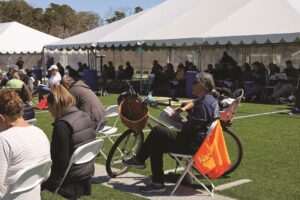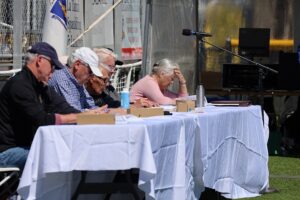EASTHAM — With nary a cloud in the sky to darken last Saturday’s Eastham town meeting at the Nauset High School football field, voters approved all but the last article on the warrant, voting 66 to 172 to reject a ban on single-use disposable plastic food containers and utensils.
The meeting opened with 297 voters in attendance — more trickled in later — well above the quorum of 236 (5 percent of Eastham’s 4,709 registered voters).
Moderator Scott Kerry welcomed voters, saying his goal was to ensure lively debate while asking “from the bottom of my heart that we treat each other with dignity and respect.”

Voters approved the first six warrant articles with little discussion, including the town’s $38,265,322 operating budget, a $5,950,000 borrowing for wastewater engineering and design, and a $1.8-million borrowing for Rock Harbor dredging.
The two borrowings are subject to Proposition 2½ ballot questions on May 16, along with $710,000 to fund bargaining agreements and nonunion wage adjustments ($550,000) and fully fund educational expenses ($160,000).
Town officials don’t expect the wastewater borrowing to increase taxes, anticipating the five-year debt service will be funded by the short-term rental tax, Cape and Islands Water Protection Fund assistance, and possibly getting interest-free loans from the State Revolving Fund.
“If we wait to be forced to do this it will only get more expensive, and state money is available now for this activity,” select board vice chair Art Autorino told the meeting. The $5.9 million will fund engineering and permitting a small wastewater system for the Salt Pond watershed system, the extension of the permeable reactive barrier to help block nitrogen from entering Salt Pond, and continued pond remediation and stormwater upgrades to Salt Pond, Minster’s-Schoolhouse Pond, and Hemenway and Collins Landings.
“This will take us to a final plan,” said Town Administrator Jacqui Beebe. “We’re actually designing a treatment collection system, and we’re getting approval from the state to spread our plan out over 20 years.”
Autorino said part of the town will have sewers. “We don’t know that final number yet,” he said.
The Rock Harbor dredging is planned for the fall of 2024 and will remove 38,600 cubic yards of sand and silt. Eastham shares the cost of dredging — done every 8 to 10 years — with Orleans, which, one voter noted, has more apparent commercial activity at the harbor than Eastham. Beebe explained that Eastham has 20 slips designated for commercial fishermen, fisheries, and aquaculture grants and 54 slips for recreational use.
“We did go through this in 2017 when we had to replace the docks and everything,” said Beebe. “That was an expensive proposition. We asked: is this something you want to spend money on? And we got a yes. We are now committed to dredging.”

Zoning Questions
The pace slowed significantly at Article 7A, the first of eight zoning updates, as voters took to the microphones with a multitude of questions and comments.
Included in the proposals by the town’s Task Force on Residential Zoning were changes to bylaw definitions, clear-cutting regulation, residential lot intensity, protection of perimeter vegetation, and site plan review standards. All were approved by voters.
Introducing the residential lot intensity article, Autorino noted, “There’s been a lot of concern in town about people stuffing big houses on small lots.” The proposed guidelines would allow people with smaller lots to expand yet restrict the square footage that could be put on a lot, Autorino explained.
He cautioned property owners to contact the planning department to determine square footage and not to depend on the numbers in the assessor’s records.
Task force chair Mary Nee said her committee sought to balance allowing growth while preserving the prevailing characteristic of residential properties.
“The average property is significantly less than 2,000 square feet,” Nee said, “so you have very small properties and that has been the prevailing characteristic. How do we put guardrails on growth and allow folks maneuverability on their lots? Gross square foot area is a conservative principle regarding size and scale and mass that we felt was reflective of the character of this town.”
The zoning articles addressed not only what could be added to a property but what could also be subtracted by regulating clear-cutting and protecting perimeter vegetation.
The proposed clear-cutting bylaw had voters asking how it would regulate their ability to remove vegetation such as poison ivy and dead or diseased trees. The bylaw would prohibit clear-cutting and the removal of “legacy trees” with a diameter of 24 inches or more on undeveloped lots without first obtaining permits from the building department. It would also prohibit their removal on developed lots within a six-foot-wide perimeter.
An amendment to remove the reference to legacy trees from the clear-cutting article failed.
Community Development Director Paul Lagg said his interpretation of the article was that if trees were dead or diseased their removal would fall under the exemptions to the bylaw. The 10 listed exemptions included “routine maintenance of vegetation and removal of hazardous trees, dead or diseased limbs necessary to maintain health of cultivated plants, to contain noxious weeds and/or vines.”
Select board chair and zoning task force member Jamie Demetri encouraged voters to approve the bylaw. “Currently, Eastham has no regulation guiding clear-cutting,” she said, “a detrimental practice for environmental reasons as well as having significant impact on abutters. I’d like to note the Wellfleet case that’s now in court; also, the Cedar Banks development here in Eastham that exposed a whole neighborhood to the sights and sounds of Route 6. The proposed amendment would require anyone who wants to clear-cut a complete lot to come before the planning board for review and discussion. More important, it would also trigger a notification to abutters who can then be part of the discussion.”
One voter inquired about the high school construction project. “They have clear-cut a bunch of the trees,” said the Queen Anne Drive resident. “None of us in the neighborhood were notified.”
Beebe replied that the trees would be restored. “The building inspector and the Seashore Park have both notified Brait Construction that they will need to do some mitigation,” she said. “And we apologize for that — that was not a planned clear-cut.”
Another resident asked if the town would be subject to the same restrictions as residential homeowners.
“You may not like my answer, but there is an exemption for municipal projects in the bylaw,” said Lagg. “The practice has been to bring municipal projects through the same regulatory process as anyone else.”
On Monday, Demetri said the zoning task force would be making sure the changes are effective. “Let’s make sure the planning board and the zoning board of appeals are all on the same page and we all understand what this means,” she said.

Plastics Ban Defeated
The failed plastics reduction article went before voters without the support of the select board, which voted unanimously not to recommend it.
“Reluctantly, we cannot support this ban in its current form for two major reasons,” said board member Aimee Eckman. “One, the petitioner has made no effort to engage Eastham’s business community, and in its current forms the bylaw may be too comprehensive by eliminating biodegradable and compostable plastics. However, we would be very supportive of any effort to reduce plastics in an inclusive manner.”
Beebe voiced concern that the town’s plastics bylaw passed in 2020 would be jeopardized by the passage of the new bylaw. “The two of them together would be on our books,” she said. “It’s very confusing, and if there was a conflict it would be a legal issue.” She suggested adding the new category of plastics to the existing bylaw next year.
Local food establishment owners told voters to vote no on the ban. Sam’s Deli owner Susan Knight brought props, holding up a plastic packaged Caesar salad from Cumberland Farms and describing the logistics of the salad’s travels from New Jersey to Eastham.
“It’s in one of the least friendly plastic containers on the planet,” said Knight. “I’ll leave the quality of the product to the buyers, but everybody that knows anything thinks that the carbon footprint on this particular product is pretty atrocious.”
She displayed a fully recyclable container used by Sam’s, saying her store’s food is prepared locally. “At Sam’s we are fully on board with eliminating waste and doing what’s right for our planet,” said Knight.
Nate Nickerson, owner of Arnold’s Lobster & Clam Bar, suggested the proposal be tabled and a committee formed to examine the plastics issue.
“I think individual residents have a hand in this, too, not just a handful of restaurants,” he said. “We should ban nip bottles, we should ban plastic bags and baggies. Now they have recyclable baggies. There’s a lot more than just knives, spoons, and forks. This petition will hurt a very small group of people who are trying to make a buck in three months when it really should include everybody. You can walk down the road a hundred feet and you can pick up a hundred nip bottles and that’s going into the ground for sure.”
Following the meeting, plastic ban petitioner Gary Senecal, a member of the Sustainable Practices environmental advocacy group, said he would bring the proposal before voters again next year.
“We definitely will be back,” he said, acknowledging that the lack of stakeholder engagement was a likely reason the article failed.



